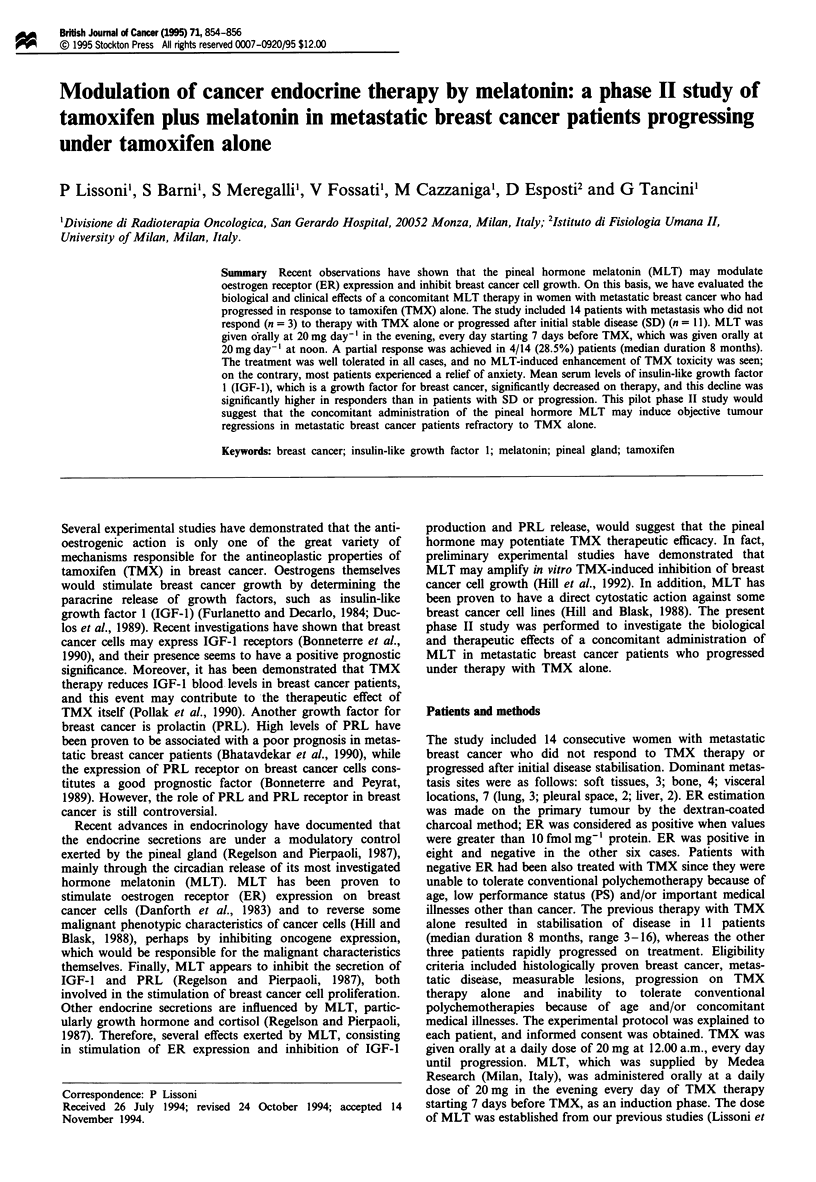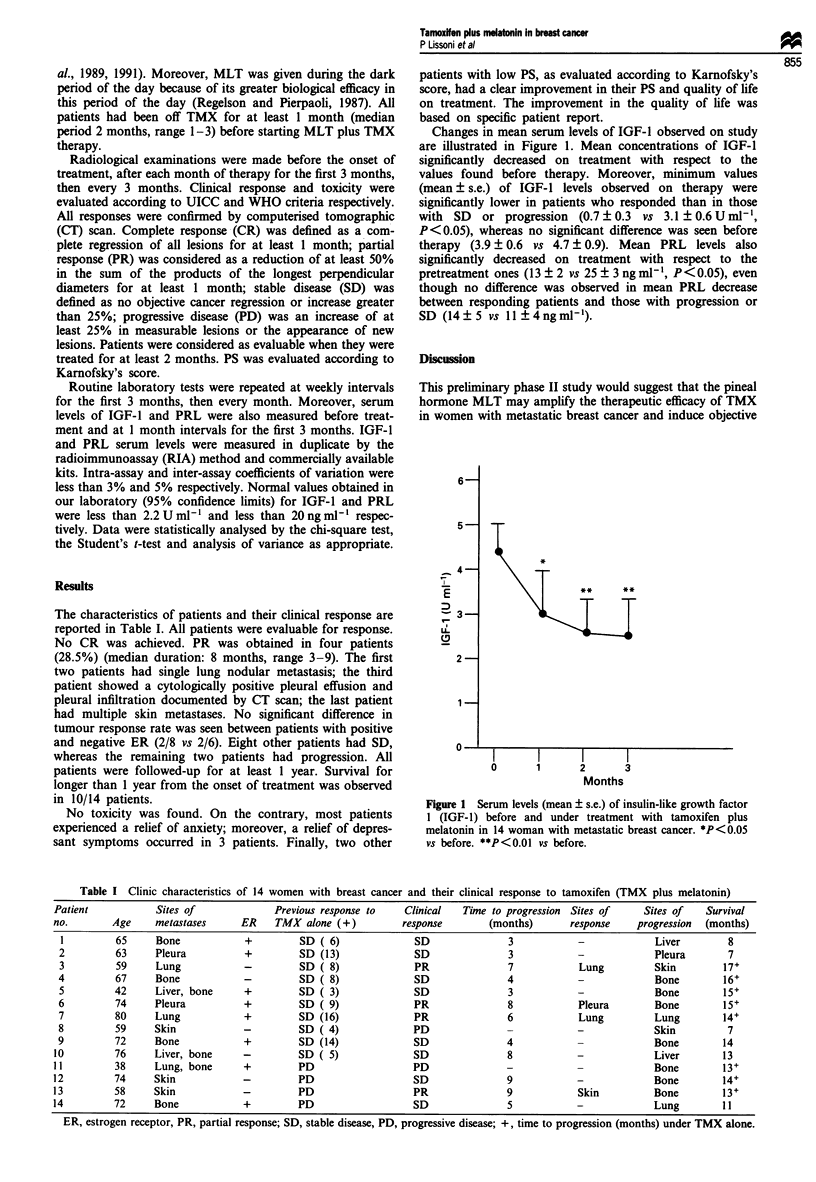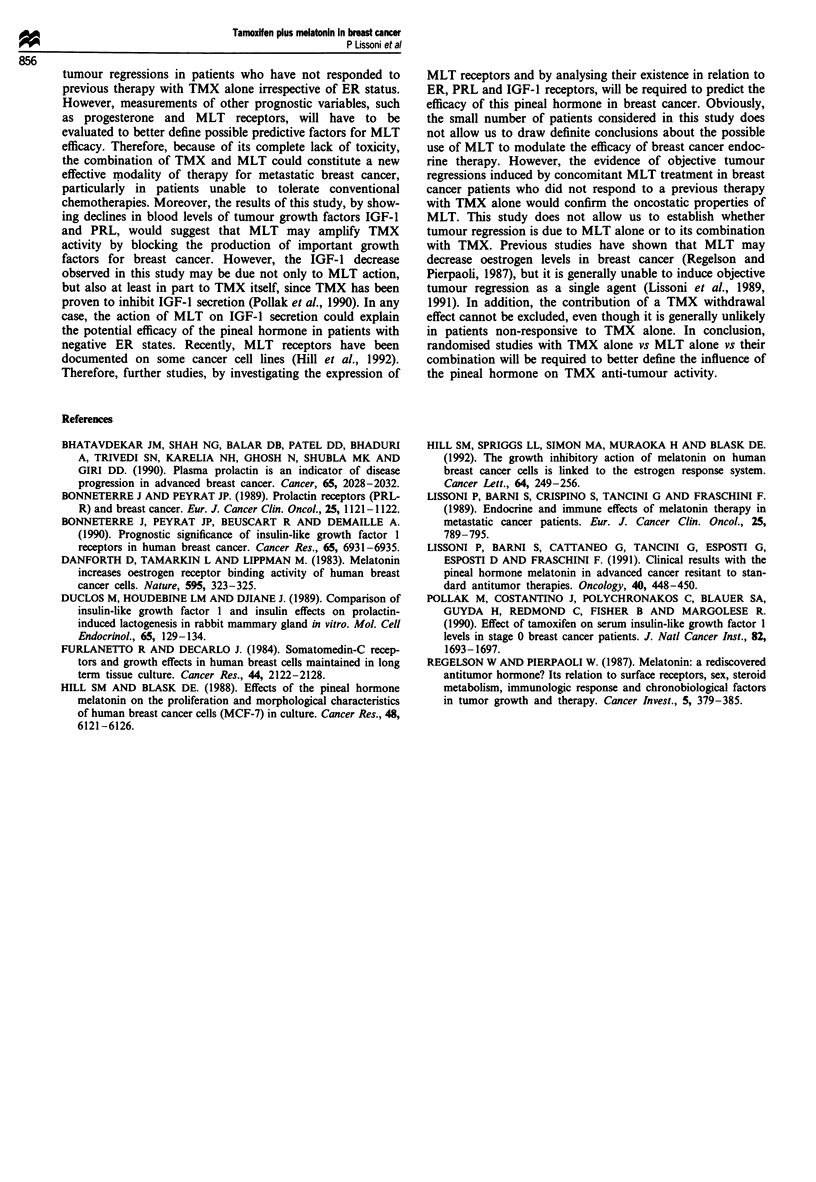Abstract
Recent observations have shown that the pineal hormone melatonin (MLT) may modulate oestrogen receptor (ER) expression and inhibit breast cancer cell growth. On this basis, we have evaluated the biological and clinical effects of a concomitant MLT therapy in women with metastatic breast cancer who had progressed in response to tamoxifen (TMX) alone. The study included 14 patients with metastasis who did not respond (n = 3) to therapy with TMX alone or progressed after initial stable disease (SD) (n = 11). MLT was given orally at 20 mg day-1 in the evening, every day starting 7 days before TMX, which was given orally at 20 mg day-1 at noon. A partial response was achieved in 4/14 (28.5%) patients (median duration 8 months). The treatment was well tolerated in all cases, and no MLT-induced enhancement of TMX toxicity was seen; on the contrary, most patients experienced a relief of anxiety. Mean serum levels of insulin-like growth factor 1 (IGF-1), which is a growth factor for breast cancer, significantly decreased on therapy, and this decline was significantly higher in responders than in patients with SD or progression. This pilot phase II study would suggest that the concomitant administration of the pineal hormone MLT may induce objective tumour regressions in metastatic breast cancer patients refractory to TMX alone.
Full text
PDF


Selected References
These references are in PubMed. This may not be the complete list of references from this article.
- Bhatavdekar J. M., Shah N. G., Balar D. B., Patel D. D., Bhaduri A., Trivedi S. N., Karelia N. H., Ghosh N., Shukla M. K., Giri D. D. Plasma prolactin as an indicator of disease progression in advanced breast cancer. Cancer. 1990 May 1;65(9):2028–2032. doi: 10.1002/1097-0142(19900501)65:9<2028::aid-cncr2820650924>3.0.co;2-9. [DOI] [PubMed] [Google Scholar]
- Bonneterre J., Peyrat J. P., Beuscart R., Demaille A. Prognostic significance of insulin-like growth factor 1 receptors in human breast cancer. Cancer Res. 1990 Nov 1;50(21):6931–6935. [PubMed] [Google Scholar]
- Bonneterre J., Peyrat J. P. Prolactin receptors (PRL-R) and breast cancer. Eur J Cancer Clin Oncol. 1989 Jul;25(7):1121–1122. doi: 10.1016/0277-5379(89)90399-4. [DOI] [PubMed] [Google Scholar]
- Danforth D. N., Jr, Tamarkin L., Lippman M. E. Melatonin increases oestrogen receptor binding activity of human breast cancer cells. Nature. 1983 Sep 22;305(5932):323–325. doi: 10.1038/305323a0. [DOI] [PubMed] [Google Scholar]
- Duclos M., Houdebine L. M., Djiane J. Comparison of insulin-like growth factor 1 and insulin effects on prolactin-induced lactogenesis in the rabbit mammary gland in vitro. Mol Cell Endocrinol. 1989 Aug;65(1-2):129–134. doi: 10.1016/0303-7207(89)90173-1. [DOI] [PubMed] [Google Scholar]
- Furlanetto R. W., DiCarlo J. N. Somatomedin-C receptors and growth effects in human breast cells maintained in long-term tissue culture. Cancer Res. 1984 May;44(5):2122–2128. [PubMed] [Google Scholar]
- Hill S. M., Blask D. E. Effects of the pineal hormone melatonin on the proliferation and morphological characteristics of human breast cancer cells (MCF-7) in culture. Cancer Res. 1988 Nov 1;48(21):6121–6126. [PubMed] [Google Scholar]
- Hill S. M., Spriggs L. L., Simon M. A., Muraoka H., Blask D. E. The growth inhibitory action of melatonin on human breast cancer cells is linked to the estrogen response system. Cancer Lett. 1992 Jul 10;64(3):249–256. doi: 10.1016/0304-3835(92)90050-6. [DOI] [PubMed] [Google Scholar]
- Lissoni P., Barni S., Cattaneo G., Tancini G., Esposti G., Esposti D., Fraschini F. Clinical results with the pineal hormone melatonin in advanced cancer resistant to standard antitumor therapies. Oncology. 1991;48(6):448–450. doi: 10.1159/000226978. [DOI] [PubMed] [Google Scholar]
- Lissoni P., Barni S., Crispino S., Tancini G., Fraschini F. Endocrine and immune effects of melatonin therapy in metastatic cancer patients. Eur J Cancer Clin Oncol. 1989 May;25(5):789–795. doi: 10.1016/0277-5379(89)90122-3. [DOI] [PubMed] [Google Scholar]
- Pollak M., Costantino J., Polychronakos C., Blauer S. A., Guyda H., Redmond C., Fisher B., Margolese R. Effect of tamoxifen on serum insulinlike growth factor I levels in stage I breast cancer patients. J Natl Cancer Inst. 1990 Nov 7;82(21):1693–1697. doi: 10.1093/jnci/82.21.1693. [DOI] [PubMed] [Google Scholar]
- Regelson W., Pierpaoli W. Melatonin: a rediscovered antitumor hormone? Its relation to surface receptors; sex steroid metabolism, immunologic response, and chronobiologic factors in tumor growth and therapy. Cancer Invest. 1987;5(4):379–385. [PubMed] [Google Scholar]


